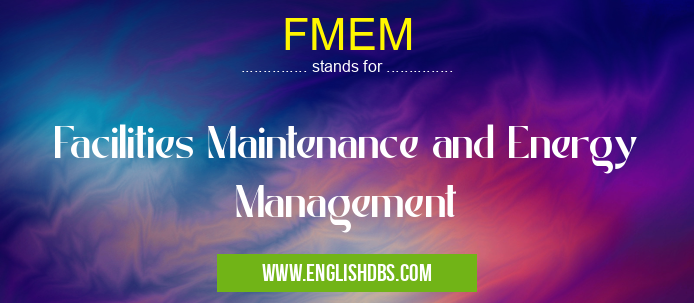What does FMEM mean in MANAGEMENT
In the realm of business operations, efficient management of facilities and energy consumption is paramount. FMEM, an acronym that stands for Facilities Maintenance and Energy Management, plays a crucial role in optimizing these aspects.

FMEM meaning in Management in Business
FMEM mostly used in an acronym Management in Category Business that means Facilities Maintenance and Energy Management
Shorthand: FMEM,
Full Form: Facilities Maintenance and Energy Management
For more information of "Facilities Maintenance and Energy Management", see the section below.
» Business » Management
What does FMEM stand for?
FMEM encompasses a holistic approach to managing facilities, ensuring their proper upkeep and efficient operation. It involves a wide range of responsibilities, including:
- Maintenance: Preventive and corrective maintenance of buildings, infrastructure, and equipment to ensure optimal performance.
- Energy Management: Optimizing energy consumption through energy audits, efficiency upgrades, and renewable energy solutions.
- Sustainability: Promoting sustainable practices, such as waste reduction, water conservation, and environmental compliance.
Significance of FMEM
Effective FMEM practices bring numerous benefits to organizations:
- Reduced Operational Costs: By optimizing energy consumption and minimizing maintenance expenses, FMEM can significantly lower operational costs.
- Enhanced Asset Lifespan: Regular maintenance extends the lifespan of facilities and equipment, reducing the need for costly replacements.
- Improved Employee Productivity: Well-maintained facilities and a comfortable work environment enhance employee morale and productivity.
- Increased Regulatory Compliance: FMEM ensures adherence to environmental and safety regulations, minimizing legal liabilities.
Essential Questions and Answers on Facilities Maintenance and Energy Management in "BUSINESS»MANAGEMENT"
What is FMEM?
Facilities Maintenance and Energy Management (FMEM) is an integrated approach to managing the maintenance and energy consumption of facilities, typically in commercial, industrial, and institutional settings. It involves optimizing building operations, reducing energy costs, and ensuring the efficient use of resources to enhance the overall performance and sustainability of the facility.
What are the key components of FMEM?
FMEM encompasses a range of key components, including:
- Maintenance Management: Planning, scheduling, and executing maintenance tasks to prevent breakdowns, extend equipment life, and ensure the proper functioning of the facility.
- Energy Management: Monitoring, analyzing, and optimizing energy consumption to reduce costs, improve efficiency, and meet sustainability goals.
- Building Automation: Using automated systems to control and monitor building operations, such as lighting, HVAC, and security, for increased efficiency and convenience.
- Asset Management: Tracking and managing the facility's physical assets, including equipment, furniture, and infrastructure, to optimize their use and extend their lifespan.
- Data Analytics: Collecting and analyzing data from building systems to identify areas for improvement, optimize operations, and make informed decisions.
What are the benefits of implementing FMEM?
Implementing a comprehensive FMEM program can yield significant benefits, such as:
- Reduced operating costs through energy savings, optimized maintenance, and reduced downtime.
- Improved occupant comfort and productivity due to efficient and well-maintained facilities.
- Enhanced asset longevity and reduced repair costs through proactive maintenance.
- Increased sustainability by minimizing energy consumption and promoting resource conservation.
- Compliance with regulations and industry standards for energy efficiency and facility maintenance.
- Improved resilience and preparedness for unforeseen events through proactive planning and maintenance.
Final Words: FMEM is an essential aspect of business management that fosters efficient facilities operation, reduces costs, enhances sustainability, and improves overall organizational performance. By embracing FMEM principles, organizations can optimize their facilities and energy usage, creating a foundation for long-term success.
